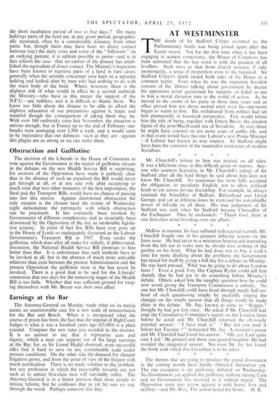AT WESTMINSTER
THE death of Sir Stafford Cripps occurred as the Parliamentary battle was being joined again after the Easter recess. Not for the first time when it has been engaging in acutest controversy, the House of Commons has been reminded that the last word is with the greatest of all levellers. Such news as that from Zurich restores, if only momentarily, a sense of proportion even to the fanatical. Sir Stafford Cripps's death united both sides of the House in a common regret. Even when he was the impatient Socialist convert of the 'thirties talking about government by decree his opponents never questioned his integrity or failed to see in him a moral elevation rare in the world of action. As he moved to the centre of his party in those later years and as office proved him not above mortal error eN en his opponents began to warm to him. His withdrawal from politics had set him prematurely in historical perspective. Few would refuse him the title of being, together with Ernest Bevin, the greatest figure of the post-MacDonald era of Socialism. At sixty-three he might have counted on ten more years of public life, and in that event would have become Labour's next Prime Minister —if Labour had known its true interest. Sir Stafford might have been the corrector of the materialist tendencies of modern Socialism.
* * * - *
Mr. Churchill's tribute to him was praised on all sides. It was a felicitous essay in this difficult genre of oratory. Any- one who suspects hypocrisy in Mr. Churchill's eulogy of Sir Stafford after all the hard things he said about him does not know Mr. Churchill. No statesman has more fully accepted the obligation, so peculiarly English, not to allow political feuds to cut across private friendship. For example. he always retained the friendship of Balfour, Birkenhead and Lloyd George, and yet at different times he exercised his redoubtable power of ridicule on all three. His true judgement of Sir Stafford was seen when Sir Stafford became Chancellor of the Exchequer. Then he exclaimed : " Thank God, there is one first-class mind brooding over our affairs."
* * * *
Mellow in manner, his face suffused with a genial warmth, Mr. Churchill fought one of his greatest delaying actions on the fares issue. He had taken to a miniature hearing-aid depending from the left ear to make sure he should miss nothing of the gunfire on his front. What he had done was to buy a week's time for more thinking about the problems the Government has raised for itself by giving a full day for a debate on Monday. He was hard pressed. What was he going to do about London fares ? Even a good Tory like Captain Ryder could tell him sharply that he had got to do something before Monday's debate. Others asked him the naughty question how he could now avoid giving the Transport Commission a subsidy. No one but Mr. Churchill could have lived through nearly half-an- hour of such questioning simply by puckishly ringing the changes on the simple answer that all things would be made plain in the debate. Mr. Jay, known to some as " Slogger," thought he had got him once. He asked if Mr. Churchill had read the Consultative Committee's report on the London fares before he acted and Mr. Churchill returned the obviously guarded answer: " I have read it." " But did you read it before last Tuesday ? " demanded Mr. Jay. A moment's pause and Mr. Churchill had found his answer. " Oh, yes; I am quite sure I did." He grinned and there was general laughter. He had avoided the categorical answer. Not even Mr. Jay has found the hook with which this Leviathan is to be taken.
* * * * The themes that are going to produce the grand dissonance in the coming month have hardly obtruded themselves yet. The one exception is the guillotine, debated on Wednesday. No Government yet applied the guillotine without raising Cain and no Government has resorted to it without regret. The Opposition went into action against it with horse, foot and artillery—and Mr. Bing. The action lasted for hours. H. B.


































 Previous page
Previous page